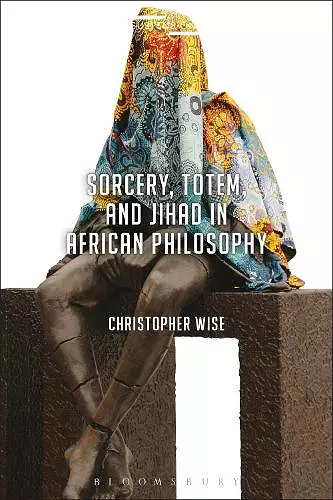Sorcery, Totem, and Jihad in African Philosophy
Format:Hardback
Publisher:Bloomsbury Publishing PLC
Published:23rd Mar '17
Currently unavailable, and unfortunately no date known when it will be back

An exciting new approach to exploring to studying Islam in Africa and African philosophy more generally.
In this significant new work in African philosophy, Christopher Wise explores deconstruction’s historical indebtedness to Egypto-African civilization and its relevance in Islamicate Africa today. He does so by comparing deconstructive and African thought on the spoken utterance, nothingness, conjuration, the oath or vow, occult sorcery, blood election, violence, circumcision, totemic inscription practices, animal metamorphosis and sacrifice, the Abrahamic, fratricide, and jihad. Situated against the backdrop of the Ansar Dine’s recent jihad in Northern Mali, Sorcery, Totem and Jihad in African Philosophy examines the root causes of the conflict and offers insight into the Sahel’s ancient, complex, and vibrant civilization. This book also demonstrates the relevance of deconstructive thought in the African setting, especially the writing of the Franco-Algerian philosopher Jacques Derrida.
This book is a major contribution to West African studies from a well-known scholar and translator of Sahelian literature. The author demonstrates a thoughtful appreciation of the region’s ancient cultural history, which is connected to philosophical themes originating in the ancient Egyptian, Abrahamic, and Hellenic contexts. It is a stelar and welcome contribution to African Studies, particularly the study of West African literature, culture, religion, and philosophy. -- Fallou Ngom, Associate Professor of Anthropology and Director of the African Language Program, Boston University, USA
I am very impressed with this book’s scope and depth. Linking Derrida to Sahelian philosophical traditions is brilliant. I have followed the author’s work for many years and the materials presented are extremely exciting. His scholarship is first rate and his devotion to the study of Sahelian philosophy is enviable. -- Paul Stoller, Professor of Anthropology, West Chester University, USA
Sorcery, Totem, and Jihad in African Philosophy offers a unique synthesis of Derrida and Sahelian politics, economics, culture, and philosophy that is highly productive and inviting. Wise's book is both timely and the product of his sustained work in this field, and it contains exciting new approaches to Islam in Africa. * Andrew Hageman, Assistant Professor of English, Luther College, USA *
In this synthesis of philosophy and anthropology, Wise (Western Washington Univ.) explains how many ancient traditions continue to function in contemporary Africa. He focuses on Mali and the Ansar Dine jihadists, and philosophical ideas range from metaphysical questions about self and universe to questions regarding social and political obligation. The main idea Wise seeks to convey is that in Mali Islam incorporated rather than replaced ancient practices. In chapter 1 Wise presents a history of the plundering of Mali, and in the remaining five chapters he discusses the philosophical underpinnings of the challenge posed by the Ansar Dine jihadists. In examining the jihadist ideology, Wise compares Derrida’s deconstructionism with African thought. The struggle, Wise writes, is about freedom, justice, and equality for all Mali citizens under the law. The problem is caste, based on a doctrine of blood-election. Wise reports that this has now reached a point where, in some regions, basic human rights apply only to those who claim to be blood descendants of the Prophet Muhammad. Not an easy read, this book requires a strong background in Continental philosophy and the culture of West Africa. References to philosophers such as Heidegger and Derrida presuppose a familiarity with their work. But Wise very effectively gives priority to African thought. Summing Up: Recommended. Graduate students, researchers, faculty. * CHOICE *
ISBN: 9781350013117
Dimensions: unknown
Weight: 462g
216 pages